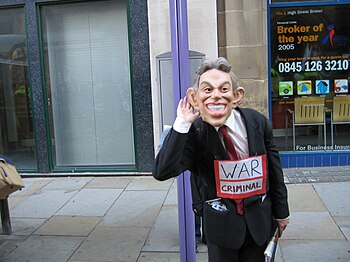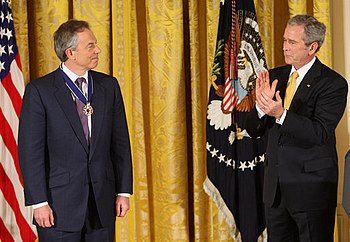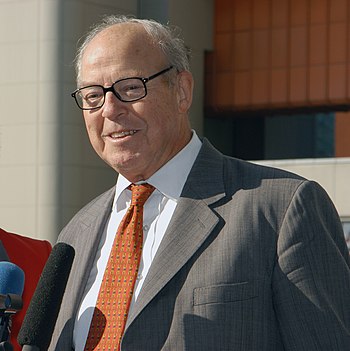 |
| BlairIraqWarDemo (Photo credit: Wikipedia) |
 |
| At the UN, Colin Powell holds a model vial of anthrax, while arguing that Iraq is likely to possess WMDs. (Photo credit: Wikipedia) |
 |
| English: President George W. Bush applauds former Prime Minister Tony Blair after presenting him in 2009, with the Presidential Medal of Freedom during ceremonies in the East Room of the White House. (Photo credit: Wikipedia) |
 |
| Hans Blix (Photo credit: Wikipedia) |
A remarkable piece of journalism has just been achieved by
a BBC reporter Peter Oborne, who, wondering why Sir John Chilcot has taken six
years to prepare his still-unreleased report on the circumstances in which
Britain entered the Iraq war, began to think that he could himself produce the
report within three weeks from already-published sources. And he has now done
so.
Oborne’s audio report sets out to ask the major questions
confronting Chilcot, such as did British Prime Minister Tony Blair lie to
Parliament about the mythical Weapons of Mass Destruction which he gave as the
reason for the war; was the war legal; did the war in effect increase rather
than decease the threat of terrorism around the world; did Blair know that the
United States was entering the war to effect regime change in Iraq; and had
Blair colluded with Bush in advance ---
almost a year in advance --- to create and execute the war?
On all of these questions except the last one, for which Oborne
says there is no hard and fast, unquestionable evidence, Oborne’s report
answers an unequivocal yes. Of course, these are not Oborne’s own conclusions
but those of the highly placed officials who were involved in all the
machinations leading to the war.
These include --- and we hear their own voices on Oborne’s
report --- Dr Hans Blix, Chairman of the
United Nations Monitoring, Verification and Inspection Commission (UNMOVIC),
2000 – 2003; Sir
Christopher Meyer, British Ambassador to the United States, 1997 – 2003;
Sir Stephen Wall, European Adviser to Prime Minister Tony Blair
and head of the Cabinet Office's European Secretariat, 2000 – 2004; Carne
Ross, First Secretary, United Kingdom
Mission to New York, 1998 – 2002; and Lady Eliza Manningham-Buller, former
director-general of MI5, the British Secret Service, who had already been
reported to have told the Chilcot Inquiry, when asked to
what extent the Iraq conflict exacerbated the threat from international
terrorism, had replied tersely: "Substantially."
Oborne calls into evidence, for example, the 17 lawyers in
the Foreign Office, to answer his question as to whether the war was legal ---
as United States and British leaders have always claimed. In fact, war is legal
in only two circumstances, first, if it is threat to the country, and second,
if it has been approved by the United Nations Security Council. Neither of
these conditions applied to the war against Iraq, which did not prevent the British and US
leaders from claiming that the UN approval given in 1990 to the first Iraq war
following the invasion of Kuwait by Saddam Hussein, could be extended all these
years later, to cover an additional invasion of Iraq, a conclusion that the
lawyers in question evidently considered ludicrous.
Of course it was obvious at the time that the Swedish
factotum who was in charge of the inspection of Iraq in search of Weapons of
Mass Destruction, Dr. Hans Blix, was not satisfied that sufficient weight was
given to the reports of his inspectors --- who carried out 700 inspections in
500 different sites --- to the effect that they had not been able to find such
weapons, evidence which was blatantly ignored and lied about by the governments
concerned.
The diplomats involved state
frankly their view that certain factors --- a speech by Jacques Chirac was one
of them --- were misrepresented in the run-up to the war --- although one of
these diplomats rather charmingly says, when asked if Blair had lied on a
particular issue, “I am a diplomat and do not use that kind of language, but it was a misrepresentation, yes.”
As to the advanced conspiracy between Blair and Bush to
bring on the war, Oborne has to conclude such theories were all based on a
meeting in Crawford, Texas, Bush’s ranch, in April 2002 at which only Blair and
Bush were present. The only evidence Oborne can produce is that the next day
Blair made a speech in which he began for the first time to refer to regime
change as an objective. Not enough hard evidence, Oborne concludes, to make a
decision one way or the other.
But did he take into account the recent release of e-mails
received by Hillary Clinton as Secretary of State, which included one from her
predecessor Colin Powell to George Bush about this April 2002 meeting, which
establish beyond doubt that the war was discussed at this meeting almost a year
before the war was launched? Powell tells Bush that Iraq will be among the
subjects Blair will want to discuss with him on his visit, and he adds:
“Blair continues to stand by you and the U.S.
as we move forward on the war on terrorism and on Iraq,” writes Powell to Bush.
“He will present to you the strategic,
tactical and public affairs lines that he believes will strengthen global
support for our common cause.”
A
second memo drafted by the U.S. embassy in London, suggests how vigorously
Blair was propagating the war:
“PM Tony
Blair has made publicly clear his commitment to a more proactive Iraq policy.
Reflecting the polled sentiments of voters, however, a sizable number of his Labour
Party MP’s remains at present opposed to military action against Iraq. A
majority indicate they would change their minds if they had proof of Iraqi
involvement in September 11 or another terrorist atrocity. Some would favour
shifting from a policy of containment of Iraq if they had recent (and publicly
usable) proof that Iraq has WMD/missiles or that Iraq’s WMD status has changed
for the worse.”
Someday
someone will probably do a study of how threats of terrorism have been
ratcheted up every time any politician in power wants to push through some anti-terrorist,
or anti-civil liberties measure. Certainly after this Crawford summit, a huge
campaign was launched complete with threats of terrorist action while British
government officials continued to accuse Iraq of having weapons of mass
destruction that the UN inspectors had already failed to find.
It is to be hoped this BBC report will jog along the publication
at long last of the Chilcot inquiry, so that the crimes of the leaders can be
placed squarely at their door.
No comments:
Post a Comment